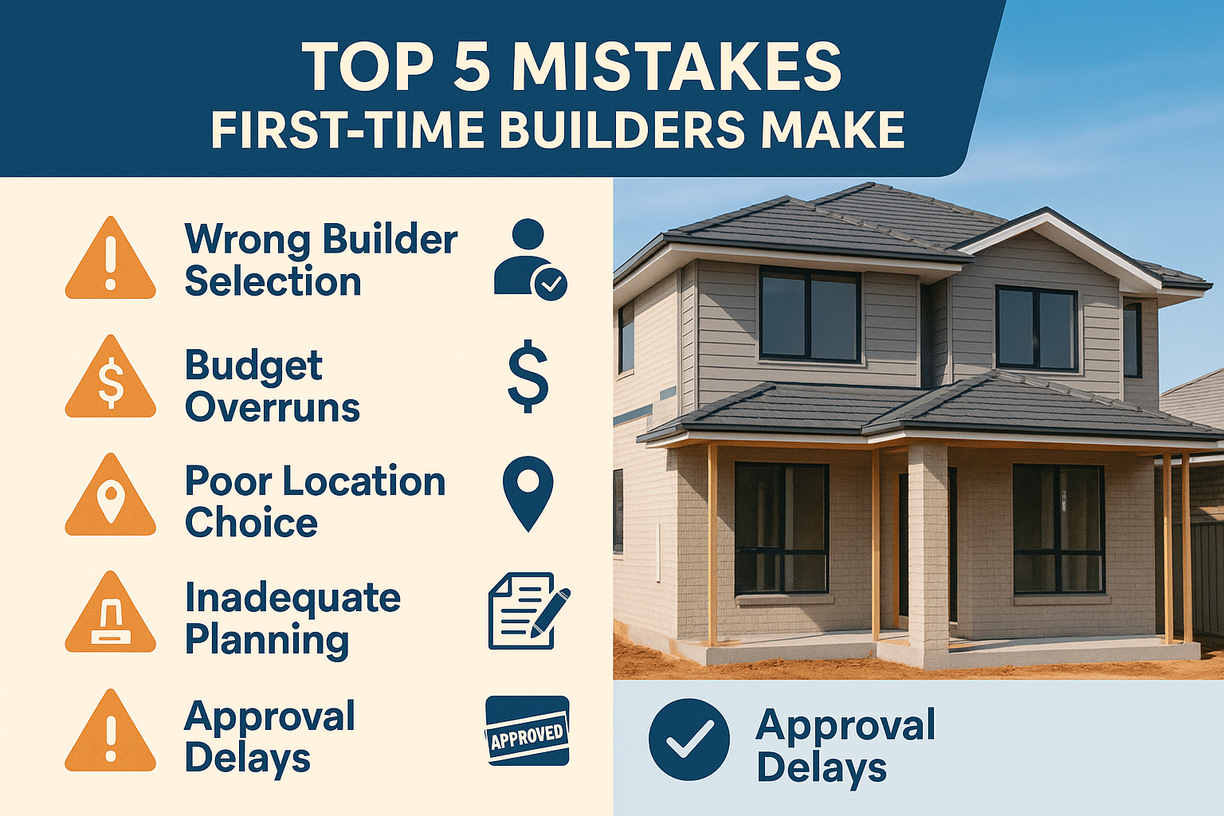Top 5 Mistakes First-Time Builders Make (and How to Avoid Them)
Top 5 Mistakes First-Time Builders Make (and How to Avoid Them)
Building your first home is an exciting milestone, but it's also fraught with potential pitfalls that can turn your dream into a costly nightmare. After years of guiding first-time builders through the construction process, we've identified the most common mistakes that can derail projects, blow budgets, and cause unnecessary stress. Understanding these pitfalls before you break ground can save you thousands of dollars and months of frustration.
Mistake 1: Choosing the Wrong Builder
The biggest mistake first-time builders make is selecting a builder based solely on price rather than value and reputation. While it's tempting to choose the lowest quote, this decision often leads to poor workmanship, project delays, and costly variations. A builder who significantly undercuts competitors may be cutting corners on materials, labor quality, or project management.
Research potential builders thoroughly by checking their licensing with your state's building authority, reviewing recent projects, and speaking with past clients. Look for builders who offer fixed-price contracts, comprehensive warranties, and transparent communication throughout the process. A reputable builder will welcome questions about their processes, provide detailed specifications, and demonstrate genuine expertise in addressing your concerns.
Mistake 2: Severely Underestimating Total Costs
First-time builders consistently underestimate the true cost of their project, focusing only on the base building contract while ignoring essential extras. Site preparation, utility connections, landscaping, driveways, fencing, and interior finishing touches can add 20-30% to your initial budget. Many builders quote attractive base prices but charge significantly for variations and upgrades.
Create a comprehensive budget that includes all potential costs, not just the building contract. Factor in soil tests, council fees, temporary accommodation if needed, and a contingency fund of at least 10% for unexpected expenses. Obtain detailed quotes that specify exactly what's included and what constitutes an additional cost. Remember that quality fixtures, fittings, and finishes significantly impact both your budget and long-term satisfaction.
Mistake 3: Ignoring Location and Growth Potential
Many first-time builders focus exclusively on the house design while neglecting the critical importance of location. Choosing land in areas with limited growth potential, poor infrastructure, or declining demographics can severely impact your property's future value. Proximity to employment centers, quality schools, public transport, and amenities significantly influences both lifestyle and investment returns.
Research local council development plans, infrastructure projects, and demographic trends before purchasing land. Consider factors like zoning changes, planned road upgrades, and new shopping or educational facilities. While outer suburban blocks may seem affordable, factor in commuting costs, limited services, and potential resale challenges. A smaller home in a better location often proves more valuable than a larger house in an area with limited growth prospects.
Mistake 4: Inadequate Planning and Documentation
Rushing into construction without thorough planning leads to costly changes, delays, and disputes. Many first-time builders fail to finalize their design completely, make decisions on the run, or don't understand their contract terms. This lack of preparation results in expensive variations, extended timelines, and compromised quality.
Invest time in detailed planning before signing any contracts. Finalize your floor plan, select fixtures and fittings, and understand exactly what's included in your building package. Read your contract thoroughly and seek legal advice if necessary. Establish clear communication protocols with your builder and document all decisions and changes in writing. Regular site inspections and progress meetings help identify issues early before they become expensive problems.
Mistake 5: Neglecting the Approval Process
Underestimating the time and complexity of obtaining building approvals can delay your project significantly. Many first-time builders assume their builder will handle everything, only to discover that council requirements, soil conditions, or design issues create unexpected delays. These delays often trigger additional costs for extended finance arrangements, temporary accommodation, or rushed construction to meet deadlines.
Start the approval process early and understand your local council's requirements. Engage qualified professionals for soil tests, surveys, and engineering reports before finalizing your design. Allow adequate time for plan modifications if required and maintain realistic expectations about approval timeframes. Work with your builder to develop contingency plans for potential delays and ensure your finance arrangements accommodate extended construction periods.
Building your first home successfully requires careful planning, realistic budgeting, and working with experienced professionals who prioritize your interests. By avoiding these common mistakes, you can navigate the construction process confidently and achieve the home of your dreams without unnecessary stress or financial strain. Remember that investing in quality advice and reputable professionals upfront saves significantly more than cutting corners during the building process.
.jpg)
